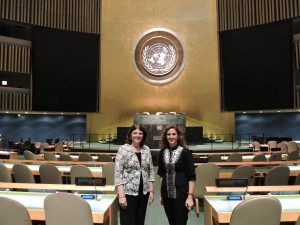
Belén Mesurado, researcher of the project, participated in the program “Parents’ Role in Helping Their Children Thrive”, held at the United Nations to commemorate the UN International Day of Families, on May 18, 2017.
 She gave a presentation on “Family and Flourishing Life: A Study in 20 Countries.” She focused on three components of children’s flourishing—emotional, psychological, and social well-being—and compared results from research on family interactions in 20 different countries. Her results showed that the quality and frequency of family interactions were good predictors of child thriving. Dr. Mesurado concluded by stating the importance of: family interaction, even in non-collectivistic cultures, promoting family interaction and encouraging public policies to enable family interactions. This paper was co-authored by Belén Mesurado (Centro Interdisciplinario de Investigaciones en Psicología Matemáica y Experimental (CIIPME)- CONICET – Universidad Austral), S. Idrovo (INALDE Business School – Universidad de Sabana Colombia) & P. Debeljuh (IAE – Business School Universidad Austral).
She gave a presentation on “Family and Flourishing Life: A Study in 20 Countries.” She focused on three components of children’s flourishing—emotional, psychological, and social well-being—and compared results from research on family interactions in 20 different countries. Her results showed that the quality and frequency of family interactions were good predictors of child thriving. Dr. Mesurado concluded by stating the importance of: family interaction, even in non-collectivistic cultures, promoting family interaction and encouraging public policies to enable family interactions. This paper was co-authored by Belén Mesurado (Centro Interdisciplinario de Investigaciones en Psicología Matemáica y Experimental (CIIPME)- CONICET – Universidad Austral), S. Idrovo (INALDE Business School – Universidad de Sabana Colombia) & P. Debeljuh (IAE – Business School Universidad Austral).
ABSTRACT: Different studies have shown that both the frequency and the quality of family relationships are related to social, emotional and psychological wellbeing. The objectives of this research is to study the differences across 20 countries (Argentina, Colombia, Mexico, Bolivia, Brazil, Ecuador, El Salvador, Spain, USA, Chile, Uruguay, Portugal, Kenia, The Philippinas, Bolivia, Canada, Italy, Guatemala, Paraguay and UK) in: 1) the level of family interaction, and 2) the level of social, emotional and psychological wellbeing, and finally, 3) to study the relation between family interaction and social, emotional and psychological wellbeing in these 20 countries. The sample included 5000 participants (250 per country, 40% males), averaging 42 years of age. The Global Home Index was used to measure the frequency of family interactions and The Multidimentional Flourishing Scale, by Mesurado et al. (2016), was used to measure wellbeing. The results indicated statistically significant differences in levels of family interaction and wellbeing by country. Moreover, the families that have higher levels of family interaction reported higher levels of wellbeing.
Keys words: social wellbeig, emocional wellbeing, psychological wellbeing, frequency of family interactions
